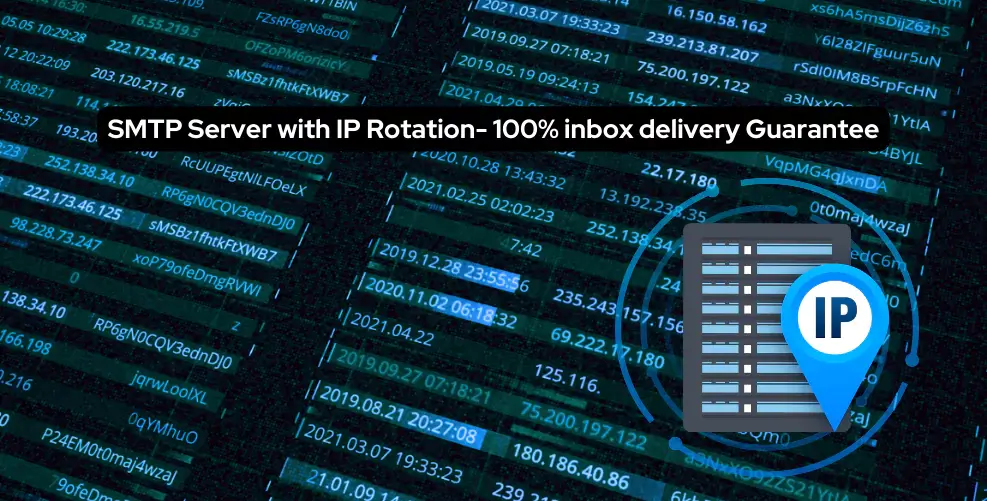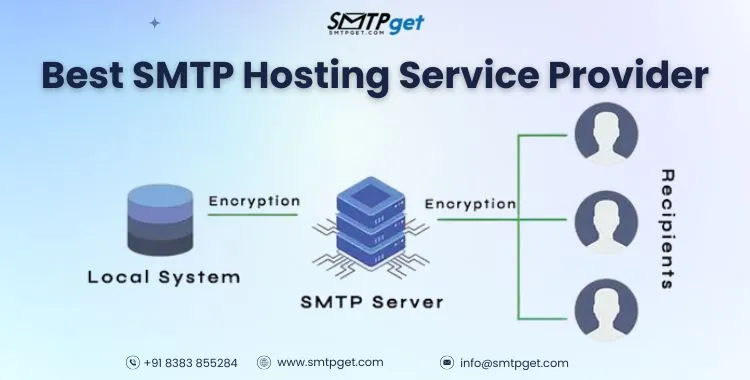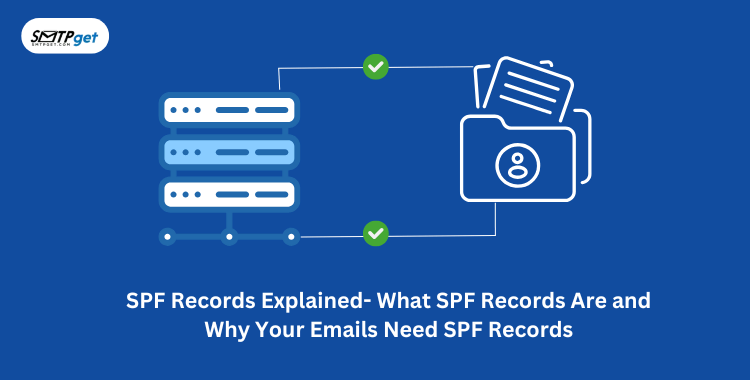Getting your emails into your recipients’ inboxes is important for any email campaign. One effective solution is using an SMTP server with IP rotation. An SMTP server, or Simple Mail Transfer Protocol server, handles sending your emails. With IP rotation, the server uses multiple IP addresses to send your emails, which helps avoid spam filters and blacklists. This method increases the chances of your emails reaching the inbox instead of the spam folder.

By distributing the email-sending load across several IP addresses, the risk of being flagged as spam is reduced, ensuring better deliverability. In this blog, we’ll discuss how an SMTP server with IP rotation can help guarantee 100% inbox delivery, making your email campaigns more successful and your communications more reliable. Understanding this technique can greatly improve your email outreach whether you’re a business owner or a marketer.
What is an SMTP Server with IP rotation?
SMTP Server IP Rotation is a specialized email server that uses a pool of multiple IP addresses to send outgoing emails. Instead of relying on a single IP address, these servers rotate through a range of IPs, providing a higher level of reliability and reducing the chances of being flagged as spam. It’s responsible for sending your emails to the right addresses. But just like a post office can get overwhelmed with too much mail, an SMTP server can also face problems if it sends too many emails from the same IP address. This can lead to emails being marked as spam or blocked entirely.

That’s where IP rotation comes in. IP rotation means using multiple IP addresses to send emails instead of just one. When an SMTP mail server uses IP rotation, it spreads out the emails across different IP addresses. This helps in several ways. First, it reduces the chances of being marked as spam because spam filters are less likely to flag emails that come from different IPs. Second, it helps avoid blacklists, which can block emails from certain IP addresses altogether.
In simple terms, an SMTP server with IP rotation is a smarter way to send large volumes of emails. It makes sure your emails get delivered to the inbox instead of the spam folder. This technique is especially useful for businesses and marketers who need to send a lot of emails without getting blocked.
Pricing Plan:
| Pricing Table | Cheapest Plan | Standard Plan | Professional Plan |
| SMTP Server Services | $110 | $165 | $220 |
| Bulk Email Server | $50 | $145 | $225 |
| Bulk Email Service | $30 | $110 | $220 |
How do SMTP Server Services Work with multiple IP Addresses?
Many SMTP servers use IP rotation to improve email deliverability and avoid spam filters. The server uses multiple IP addresses instead of sending all emails from a single IP address. This spreads the email traffic across several IPs, reducing the chances of being flagged as spam. When an email is sent, the server selects an available IP address from a pool and uses it to deliver the message. For the next email, a different IP address is chosen.
This rotation helps prevent any single IP from being overloaded or blacklisted, ensuring more of your emails reach inboxes. IP rotation is particularly useful for businesses sending large volumes of emails, as it improves deliverability and maintains a good sender reputation.
Benefits of SMTP Servers with IP Rotation
Here are the benefits of SMTP Server IP Rotation:
Boost Deliverability: With IP rotation, the chances of emails reaching the recipient’s inboxes significantly increase. By avoiding blacklisted or flagged IP addresses, it maintains a positive reputation, leading to improved deliverability rates.
Improved IP Reputation: With the help of an SMTP server with IP rotation, ensure that the reputation of the sending IPs remains favorable. This reduces the risk of being blocked or marked as spam, allowing businesses to maintain reliable email communication with their customers.
Higher Sending Capacity: SMTP Server IP Rotation offers increased sending capacity by utilizing multiple IP addresses. This allows businesses to send a higher volume of emails without triggering sending limits imposed by email providers.
Better Email Analytics: By using PowerMTA server IP rotation, businesses gain access to complete email analytics. These analytics provide insights into SMTP servers for email marketing to email delivery rates, open rates, click-through rates, and bounce rates, enabling companies to optimize their email marketing strategies.
Increase Email Deliverability with SMTP Server IP Rotation
To maximize the benefits of PowerMTA server IP rotation and enhance email deliverability, consider the following best practices:
Maintain a Clean Email List: Regularly clean your email list by removing inactive or unsubscribed contacts. This ensures that your emails are targeted and relevant, reducing the chances of being marked as spam.
Authenticate Your Domain: Implement email authentication protocols such as SPF, DKIM, and DMARC to verify the authenticity of your emails. This helps establish trust with email providers and improves deliverability.
Monitor IP Reputation: Keep an eye on your sending IPs’ reputation by regularly checking for blacklisting or spam reports. If any issues arise, take immediate action to rectify the situation and maintain a positive reputation.
Personalize and Segment Emails: Customize your emails for different groups of people by making the content personal and organizing your email list. This makes people more interested in your emails and less likely to mark them as spam.
What are the different IP rotation methods?
IP rotation is a technique used to improve email deliverability by sending emails from different IP addresses. There are several methods for rotating IPs:
Round-Robin Rotation: This method cycles through a list of IP addresses in order, ensuring each one gets used equally. It’s simple and effective for distributing the load.
Random Rotation: IPs are selected randomly from a pool, adding an extra layer of unpredictability. This can help avoid patterns that spam filters might detect.
Weighted Rotation: In this approach, some IPs are used more frequently than others based on their reliability and performance. It’s useful for prioritizing high-quality IPs.
Time-Based Rotation: IP addresses are changed at regular intervals, like every hour or day. This method helps prevent a single IP from being overused within a short period.
Each method has its benefits, and choosing the right one depends on your specific needs and email-sending volume.
Factors to Consider when Choosing an SMTP Provider
When selecting a cost-effective SMTP provider for your IP rotation needs, consider the following factors:
IP Rotation Capabilities: Make sure that the dedicated SMTP service provider offers IP rotation functionality so that you can effectively distribute sending across multiple IPs.
Deliverability and Reputation: First, research the provider’s reputation. Additionally, review their deliverability rates to ensure high-quality service and, ultimately, reliable email delivery.
Scalability: Choose a provider that can accommodate your growing email needs and offers flexible plans to scale accordingly.
Analytics and Reporting: When selecting SMTP Server Provider, ensure they offer detailed analytics and reporting features so that you can monitor the success of your email campaigns.
Read More: Hosted Email Services: Unlocking Efficiency and Security & Exploring the Benefits.
Setting Up an SMTP Server with IP Rotation
To set up an SMTP server with IP rotation, follow these steps:
Select an SMTP Provider: Choose a reputable SMTP mail server that offers IP rotation capabilities and meets your specific requirements.
Configure Sending IPs: Set up a pool of multiple sending IPs provided by your SMTP server for email marketing.
Authenticate Your Domain: Implement SPF, DKIM, and DMARC records to authenticate your domain and improve deliverability.
Integrate with Email Software: Integrate the SMTP server with your preferred email software or marketing automation platform.
Configure IP Rotation Settings: Set the desired IP rotation frequency and rules according to your needs and provider’s guidelines.
Best Practices for Using PowerMTA IP Rotation
To maximize the effectiveness of PowerMTA IP rotation, consider the following best practices:
Maintain IP Warm-up: Gradually increase the sending volume and frequency to warm up new IP addresses and establish a positive sending reputation.
Regularly Monitor Deliverability: Monitor email deliverability metrics and identify any issues or areas for improvement. Make necessary adjustments to enhance deliverability rates.
Keep Your IP Pool Updated: Regularly review and update your IP pool by replacing underperforming IPs or adding new ones. This ensures optimal deliverability and reputation management.
Stay Compliant with Email Regulations: Familiarize yourself with email regulations and anti-spam laws to ensure compliance and maintain a positive sender reputation.
Read More: Outbound SMTP Relay Service Provider: Streamline Your Email Communication
Common Challenges and Troubleshooting Tips
Here are Some Common Challenges and troubleshooting tips:
Blacklisting: If one of your sending IPs gets blacklisted, promptly contact your SMTP provider for assistance in resolving the issue and removing the IP from the blacklist.
Bounces and Complaints: Monitor bounce rates and feedback loop data to identify potential issues with your email list. Remove bounced and complained email addresses to maintain a healthy sender reputation.
Spam Folder Placement: If your emails consistently land in recipients’ spam folders, review your email content and sender reputation. Adjust your email content and follow best practices to improve deliverability.
IP Rotation Configuration: If you encounter difficulties configuring IP rotation settings, reach out to your SMTP provider’s support team for guidance and troubleshooting.
Future Trends in SMTP Servers and IP Rotation
The PowerMTA SMTP IP rotation field is continuously evolving to meet the changing demands of email deliverability. Here are some future trends to watch out for:
Advanced IP Rotation Algorithms: SMTP providers will develop more sophisticated algorithms for IP rotation, ensuring optimized delivery rates and improved sender reputation management.
Artificial Intelligence and Machine Learning: AI and ML technologies will be integrated into SMTP servers to analyze email engagement patterns, predict deliverability issues, and recommend optimization strategies.
Enhanced Analytics and Reporting: SMTP providers will offer more detailed and real-time analytics, allowing businesses to gain deeper insights into email performance and make data-driven decisions.
Greater Integration with Marketing Platforms: SMTP servers will seamlessly integrate with popular marketing automation platforms, enabling enhanced email campaign management and targeting capabilities.
Automation and Personalization: The bulletproof SMTP server will incorporate advanced automation features, enabling personalized email experiences at scale, and resulting in higher engagement and deliverability rates.
Conclusion:
Utilizing an SMTP server with IP rotation is a powerful strategy to ensure reliable email delivery and overcome challenges associated with spam filters and blacklisting. By rotating IP addresses, businesses can enhance deliverability, maintain a positive sender reputation, and maximize the effectiveness of their email marketing efforts. As the field continues to evolve, leveraging the benefits of SMTP servers with IP rotation will become increasingly vital for successful email communication.








